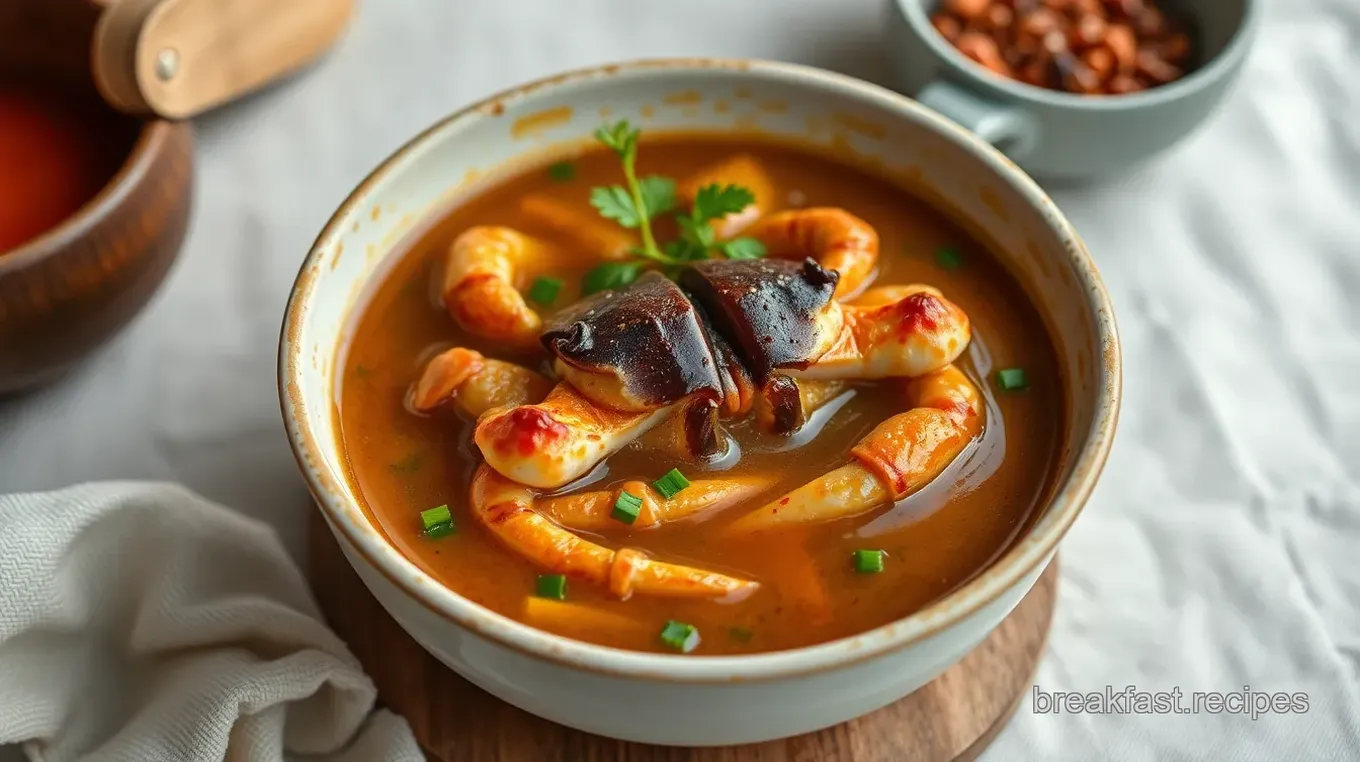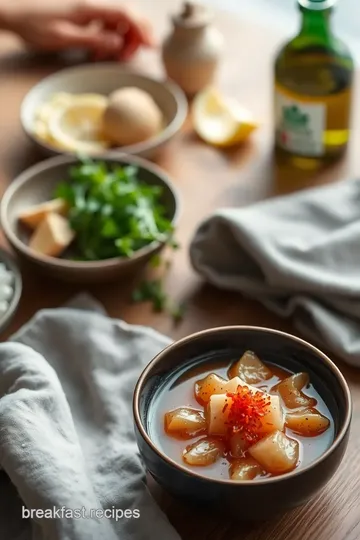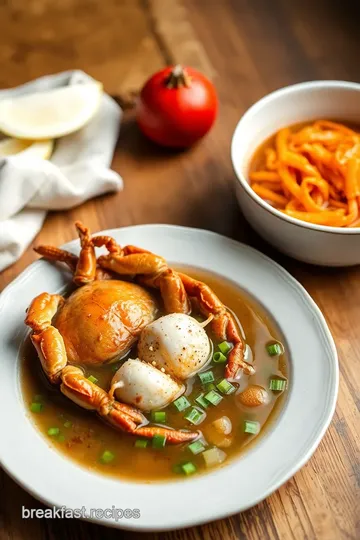Ocean's Essence: Slow-Cooked Spider Crab Flavorful Broth
Ever wondered how to create the perfect Slow-Cooked Spider Crab Flavorful Broth? Let me share my family's secret recipe and tips for a comforting, ocean-infused delight.

- look into into Deliciousness: Slow-Cooked Spider Crab Flavorful Broth
- Essential Ingredients Guide: look into Into Flavorful Cooking!
- Unlocking the Flavor: Mastering Professional Cooking Techniques
- Pro Tips & Secrets
- Perfect Presentation
- Storage & Make-Ahead
- Creative Variations
- Complete Nutrition Guide
- Expert FAQ Solutions
- Recipe Card
look into into Deliciousness: Slow-Cooked Spider Crab Flavorful Broth
You know those cozy evenings when the wind howls outside, and you just want to curl up with something warm and comforting? well, let me tell you about my latest kitchen adventure— slow-cooked spider crab flavorful broth .
Picture this: i was rummaging through my pantry, dreaming about coastal cuisine, and i stumbled across a couple of fresh spider crabs.
The moment i laid eyes on those beauties, i knew i was in for a treat. nothing beats the rich crab broth simmering on the stove, filling your home with delicious aromas.
A Taste of Tradition Meets Modern Palate
This recipe isn’t just a random kitchen experiment. slow-cooked broths have been around forever. folks have been crafting rich crab broth for generations along our shores, celebrating the ocean’s bounty.
Today, this classic dish has found its way into modern kitchens, and honestly? it’s still just as fabulous! the sweet, delicate flavors from fresh crab paired with vibrant veggies are bound to elevate any meal.
Now, don’t be scared off by the medium difficulty level! sure, it takes a little patience—with about 20 minutes of prepping and a cozy 4-hour cook time .
But that slow cooking is where all the magic happens—trust me! plus, you’ll end up with about 4 servings , so it’s great for a family dinner or a cozy gathering.
Why You Should Make This Broth
Let’s get real here. this isn’t just any broth; it’s packed with health benefits. when you’re cooking with fresh crab, you’re serving up a plate loaded with nutrients.
Crab broth nutritional benefits include high protein and essential vitamins. seriously, it’s like a warm hug in a bowl!
The unique selling point? the umami flavors are off the charts. this broth is versatile enough to shine on its own as a comforting soup, or serve it up with some crusty bread for dipping.
And if you’re feeling adventurous, you could even turn it into a base for a spicy crab soup variation. it’s a fantastic centerpiece for parties or just a chill night at home.
And don’t forget , you can make this broth your own! whether you want to stir in some white wine for depth or switch it up with fresh herbs, this recipe allows for creativity.
Time to Gather Your Ingredients
You might be thinking, “what do i need to whip up this delicious slow-cooked spider crab flavorful broth ?” i’ll tell you—it’s simpler than you think.
With just a handful of ingredients including two spider crabs , some aromatic veggies, and water, you’re on your way to genius.
I always find that using best ingredients for crab broth is key. fresh crabs are your first line of attack; the fresher they are, the better your broth will taste.
Don’t forget to add some herbs—like parsley or thyme—to really elevate the flavor.
When it comes to cooking, having the right tools can make all the difference. grab a sturdy stockpot or a slow cooker, and make sure to have a strainer handy for that glorious broth.
And hey, if you’re not sure how to clean spider crabs, don’t sweat it—i’ll walk you through that in a bit!
So, are you ready to dive in? the ocean’s essence awaits, and it’s time to fill your kitchen with fragrant delights.
Let’s gather those ingredients and start cooking this amazing aromatic seafood soup . your taste buds will thank you later!

Essential Ingredients Guide: look into Into Flavorful Cooking!
Oh my gosh, if you’re anything like me, cooking can sometimes feel like a treasure hunt. You know, looking for that perfect ingredient that just takes your dish to the next level? Well, grab your spatula because we’re diving deep into the Essential Ingredients Guide that’s gonna make your kitchen game strong!
Premium Core Components
First things first, let’s talk about those premium core components that create a remarkable dish. whether you’re brewing up a cup of comfort with a slow-cooked spider crab flavorful broth or whipping up a quick seafood stir-fry, knowing your benchmark ingredients is key.
For your broth, you’ll want 2 large spider crabs (about 1.5 lbs each ) and 4 cups (960 ml) of water .
Oh, and don’t forget your aromatics! we use 1 medium onion , 2 celery stalks , 2 medium carrots , and a handful of garlic cloves to hit that savory note.
But here’s the kicker— quality matters ! look for crabs that smell like the ocean, not fishy.
Store those crabs in the fridge and use them within 1-2 days for max freshness. for pantry staples, keep your spices in a dark place and always check for expiration dates.
Freshness is everything, and trust me, you don’t want old spices ruining your broth!
Signature Seasoning Blend
Now onto my favorite part— signature seasoning blend ! this is where all the fun happens. for a broth packed with umami flavors, you gotta have the right spices.
I recommend using black peppercorns (just a pinch!) and a bay leaf . if you're feeling adventurous, throw in some dried thyme and the zest of a lemon for that bright pop!
Pair those with fresh herbs—like parsley or dill —to not only enhance the flavor but to add a little color to your crabby masterpiece .
This is also where regional variations shine. if you wanna spice it up, look into spicy crab soup variations ! think a kick of jalapeño or thai chilies —yum!
Smart Substitutions
Now, let's talk smart substitutions . it’s totally normal to find that you’re missing an ingredient when you’re ready to cook.
No worries! if you don’t have crabs on hand, try dungeness crab or even lobster . if you’re cooking for someone with dietary restrictions, you can mix it up and use mushrooms instead.
Sometimes, even a little vegan broth can work wonders in a pinch! Who knew cooking could be this versatile?
Kitchen Equipment Essentials
Okay, let’s not overlook the kitchen equipment essentials . you need a sturdy stockpot or slow cooker to let those flavors mingle.
A good strainer or mesh sieve is crucial for separating your delicious broth from the solids. i can’t stress enough how much easier life is with a sharp chef's knife —if you can slice through veggies like butter, you’re already winning!
And here’s a tip from me: having a good wooden spoon can make a world of difference while stirring that simmering pot of love!
Wrap-Up
So, there ya have it! this essential ingredients guide is all about setting you up for success in the kitchen, especially when creating amazing seafood broth recipes like our slow-cooked spider crab flavorful broth .
Remember, cooking should feel like an adventure, not a chore. when you’ve got the right tools and ingredients, the journey is half the fun!
Stay tuned for the instructions section, where we’ll dive headfirst into creating your own coastal-inspired dish that’ll have your friends raving! Who knows, they might even think you're a gourmet chef—shh, I won't tell!
Unlocking the Flavor: Mastering Professional Cooking Techniques
Cooking like a pro isn’t just for the culinary school graduates or the chefs in those fancy restaurants. with a little preparation and some clever techniques, you can bring that gourmet experience home! today, we're diving into the essential prep steps, the nitty-gritty of cooking strategies, expert techniques, and a few success strategies to get you cooking up a storm—like our slow-cooked spider crab flavorful broth that’ll make your neighbors jealous.
Essential Preparation Steps
Mise en place: first things first, you need to have everything prepped and ready to go. “mise en place” is just a fancy way of saying “everything in its place.
” chop your veggies, measure your spices, and have your crab ready. it's amazing how much smoother things go when you aren’t scrambling for that missing carrot.
Time management tips: try setting a timer while you’re prepping and cooking. blocking your time helps you to focus. start your broth, then while it's simmering, you can clean up that mess you’ve made on the counter.
Organization strategies: lay out all your ingredients in the order they’ll go into the pot. you know, like stacking your ingredients in a lineup.
It's much easier than searching through cupboards halfway through cooking.
Safety considerations: never forget the basics of kitchen safety. always have a towel nearby to grab hot pots, and when dealing with fresh crab, make sure your sharp knife is handled with care.
You don’t want to turn a cooking adventure into a hospital visit, you know?
Step-by-Step Process
-
Prepare the crabs: start by rinsing those spider crabs under cold water. boil them in a pot for 5- 6 minutes before they hit the broth.
It’s like a little spa treatment for your crab!
-
Sauté the aromatics: heat it up! drizzle that olive oil into a large pot and bring it to medium heat.
Toss in your chopped onion, celery, and carrots. enjoy the sweet smell wafting through your kitchen! sauté them for about 5- 7 minutes , then throw in minced garlic for the final minute.
-
Combine Ingredients: Add your crabs and all the goodness: water, bay leaf, and peppercorns. Feeling adventurous? Toss in some lemon zest or dried thyme for an added kick.
-
Slow Cook: Bring the mixture to a gentle simmer. Lower the heat, cover, and let it cook for a glorious 4 hours . Stir it occasionally because it loves that personal touch!
-
Strain the Broth: After all that love, carefully remove the crabs and strain the broth. It’s now ready to shine.
-
Season to Taste: Add salt and any other herbs to elevate it to the next level. Trust me; your taste buds will thank you.
-
Serve: Ladle that gorgeous broth into bowls and garnish it with fresh parsley. It’s like a cozy hug in a bowl—perfect for chilly evenings!
Expert Techniques
Don't be intimidated! Here are some expert tips to keep in your back pocket:
-
Critical steps explained: ensure your crab is fresh; trust me, it makes all the difference. also, slow and low cooking is where the magic happens, bringing those umami flavors to life in this aromatic seafood soup.
-
Quality Checkpoints: Taste as you go. If something’s missing, a little more salt or a splash of white wine might just do the trick.
-
Troubleshooting Tips: If your broth turns murky, it could be due to boiling too hard or not skimming the surface. Don’t despair; it will still taste great!
Success Strategies
Listen up, friends! Here’s what not to do:
-
Avoid overcooking the crab. You definitely don’t want rubbery shellfish.
-
Quality assurance means using clean, fresh ingredients and the right balance of flavors. Always taste and adjust!
-
Want to get ahead? Make a batch of this Slow-Cooked Spider Crab Flavorful Broth the night before. Letting it sit overnight allows those flavors to deepen.
This is a dish that’s not just a recipe; it’s an experience—a dive into coastal cuisine that brings the ocean right to your kitchen.
With the rich crab broth at the heart of it, serve it alongside some crusty bread and you’ve got yourself a defining moment.
So, if you’re dreaming of those perfectly flavored, healthy crab dishes , keep these tips tucked away. Stick around because we’re about to explore additional information on how to navigate with crabs and seafood; it’s something you won’t want to miss!

Pro Tips & Secrets
Oh my gosh, let's dive into the tips that'll take your slow-cooked spider crab flavorful broth from good to absolutely amazing ! first off, make sure your crabs are as fresh as possible.
Trust me, it makes all the difference. you can usually tell by the smell—if it’s a good ocean breeze, you’re golden!
Now, time-saving techniques? try this: while your broth is simmering away, prep other ingredients for your next meal. i love getting a headstart on the week’s meals while enjoying the sweet aroma of seafood broth wafting through the kitchen.
For flavor enhancement, i always add a splash of white wine towards the end. just a little bit can bring that umami flavor into overdrive—honestly, you won’t regret it! and here’s a secret: if you want to really impress, a handful of fresh herbs sprinkled on right before serving makes everything pop.
When it comes to presentation, less is more . A wide bowl with the broth ladled in and a sprinkle of bright green parsley is simple but elegant.
Perfect Presentation
Presentation is where you can let your creativity run wild! try plating techniques like using a deep bowl that gives the broth room to shine.
Consider garnishing with fresh parsley or even edible flowers if you’re feeling fancy. the visual appeal is just as important as the flavor—who doesn’t eat with their eyes first?
For color combinations, think about contrasting colors. maybe a vibrant arugula salad on the side with a drizzle of citrus dressing.
They say people eat with their eyes, so make sure your dish looks inviting.
Storage & Make-Ahead
Planning ahead can help you savor that rich crab broth for days. once your slow-cooked spider crab flavorful broth has cooled, transfer it to airtight containers.
It lasts about 3-4 days in the fridge, but if you want to stretch its life, toss it in the freezer where it can stay good for about 2 months.
Reheating is a breeze, just make sure to do it gently to keep all those delicate seafood flavors intact. i usually warm it up on the stovetop over low heat.
Be careful not to let it boil or you’ll lose that lovely broth texture.
Creative Variations
What about making this recipe your own? Feel free to take it in different directions! Want something spicy? Try adding a couple of Thai chilies or some Sriracha.
Thinking about the seasons? You can swap in seasonal vegetables to reflect what's fresh! Asparagus in spring or squash in autumn can completely change the vibe.
And if you need some dietary modifications, subbing in mushrooms for the spider crab instantly makes it a vegan delight.
Complete Nutrition Guide
Now, let’s talk nutrition . this broth is not just flavorful but loaded with healthy benefits! each serving is about 150 calories filled with protein and good fats from those crazy nutritious crabs.
If you’re watching your sodium, just be mindful of how much salt you add.
You can gain even more health benefits by loading it up with fresh and colorful vegetables. Think fiber from carrots or antioxidants from leafy greens.
Expert FAQ Solutions
Got questions? I’ve heard ’em all! One common issue is making sure your broth isn’t too salty. Start light on seasonings and adjust until you hit that sweet spot!
Troubleshooting? if your broth turns out murky, try straining it twice. you’d be surprised at how much clearer it becomes! want to switch it up? try swapping crabs for lobster for a totally different flavor profile.
So there you have it! with these tips and tricks up your sleeve, you’re ready to whip up the ultimate slow-cooked spider crab flavorful broth.
This is more than just a recipe; it’s a home-cooked treasure that warms the heart and soul. give it a shot, and i promise, you’ll have everyone asking for seconds.
Trust me, there’s nothing quite like a hearty bowl of aromatic seafood soup to bring the family together. happy cooking, friends!

Ocean's Essence: Slow-Cooked Spider Crab Flavorful Broth Card

⚖️ Ingredients:
- 2 large spider crabs (approximately 1.5 lbs each)
- 4 cups water
- 1 medium onion, chopped
- 2 celery stalks, chopped
- 2 medium carrots, sliced
- 4 cloves garlic, minced
- 1 bay leaf
- 1 tsp black peppercorns
- 1 tbsp olive oil
- Salt to taste
- Fresh parsley for garnish (optional)
- 1 teaspoon dried thyme (optional)
- Zest of 1 lemon (optional)
🥄 Instructions:
- Step 1: Rinse the spider crabs under cold water. Place the crabs in a stockpot with boiling water for 5-6 minutes to kill and then cool. Crack the claws to help release flavor.
- Step 2: In the same pot, heat olive oil over medium heat. Add chopped onion, celery, and carrots. Sauté until softened, about 5-7 minutes. Add minced garlic and cook for an additional minute until fragrant.
- Step 3: Add the cracked crabs to the pot, followed by water, bay leaf, peppercorns, and any optional aromatics.
- Step 4: Bring the mixture to a simmer. Reduce heat to low, cover, and cook for 4 hours, stirring occasionally.
- Step 5: After cooking, carefully remove the crabs. Use a strainer to separate the broth from the solids.
- Step 6: Adjust seasoning with salt and additional herbs as desired.
- Step 7: Ladle the broth into bowls, garnishing with fresh parsley.
Previous Recipe: Easy Quick Tofu Scramble with Spinach Delight: My Flavorful 10-Minute Breakfast
Next Recipe: Amazing Bake Oat Muffins with Crunchy Topping: A Cozy Morning Treat
